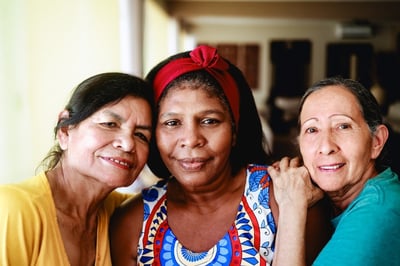FORCE's eXamining the Relevance of Articles for You (XRAY) program looks behind the headlines of cancer news to help you understand what the research means for you.
XRAY is a reliable source of hereditary cancer research-related news and information.
Learn more about the XRAY program
All XRAYs
Relevance: Medium-High


Strength of Science: High


Research Timeline: Post Approval


Study : Lifetime cancer risks in people with an inherited mutation in CDH1
Relevance: Medium-High


Strength of Science: High


Research Timeline: Post Approval


Most relevant for: People with an inherited mutation in CDH1
This study looked at the lifetime risks of stomach and breast cancer in families with a known CDH1 mutation. Results from the study suggest that for some CDH1 mutation carriers lifetime stomach cancer risk is lower than previous research has shown. Additionally, study results show that the lifetime risk of breast cancer is similar to previous lifetime risk estimates in women with mutations in this gene. (Posted 12/10/24)
Read More
Article : Life with a high-risk pancreatic and melanoma cancer mutation
Most relevant for: People with an inherited mutation in CDKN2A
One woman seeks genetic testing after her sister died of pancreatic cancer. Despite how her family’s mutation in the CDKN2A gene resulted in multiple cancer diagnoses and deaths and a suspicious finding during her own pancreatic cancer screening, Amarensia Spruitenburg shares a message of hope and gratitude. By telling her story, Amarensia highlights the impact that hereditary cancer can have on families. (Posted 11/22/24)
Read More
Relevance: Medium-High


Strength of Science: Medium-High


Research Timeline: Post Approval


Study : Moderate exercise delays time to breast cancer recurrence
Relevance: Medium-High


Strength of Science: Medium-High


Research Timeline: Post Approval


Most relevant for: People with breast cancer who are interested in using exercise to reduce risk of recurrence
For premenopausal women with early-stage breast cancer, physical activity may increase the time before cancer returns and spreads. In this study, people with hormone receptor-negative (HR-negative) breast cancer benefited from moderate exercise—more than those with hormone receptor-positive (HR-positive) breast cancer. This study found that outcomes improved when weekly exercise time was between 90 minutes and 5 hours. (Posted 11/14/24)
Read More
Relevance: Medium-High


Research Timeline: Post Approval


Update : News from the FDA: New endometrial cancer approvals
Relevance: Medium-High


Research Timeline: Post Approval


Most relevant for: People with endometrial cancer
The FDA recently approved three new immunotherapy treatments (Jemperli, Imfinzi and Keytruda) for advanced endometrial cancer. (Posted 11/7/24)
Read More
Relevance: Medium


Strength of Science: Medium


Research Timeline: Post Approval


Study : Impact of breast cancer and BRCA mutations on fertility preservation
Relevance: Medium


Strength of Science: Medium


Research Timeline: Post Approval


Most relevant for: People considering fertility preservation.
Timely family planning discussions are important for people diagnosed with breast cancer as well as those who have an inherited a BRCA1 or BRCA2 mutation. This study looked at the number of mature eggs recovered when ovaries were stimulated for fertility preservation or preimplantation genetic testing among three groups and found that the number of eggs collected was similar. (Posted 10/31/24)
Este artículo está disponible en español.
Read More
Relevance: Medium


Strength of Science: Medium-High


Research Timeline: Post Approval


Study : More research points to the benefits of pancreatic cancer screening
Relevance: Medium


Strength of Science: Medium-High


Research Timeline: Post Approval


Most relevant for: People undergoing pancreatic cancer screening
People with a family history of pancreatic cancer or those who have an inherited mutation that increases risk may benefit from yearly pancreatic cancer screening. Yearly screening may lead to early diagnosis and longer survival. (Posted 10/8/24)
Este artículo está disponible en español.
Read More
Study : Use of cannabis for cancer symptom management
Most relevant for: People with cancer interested in using cannabis to help manage symptoms.
Among people with cancer, interest in the use of cannabis to manage cancer symptoms and treatment side effects is high. The world's leading professional organization of oncologists has published strategies to help adults with cancer and their healthcare providers have open, nonjudgmental discussions about the use of cannabis to manage cancer symptoms. (Posted 9/27/24)
Este artículo está disponible en español.
Read More
Relevance: Medium-High


Strength of Science: Medium-High


Research Timeline: Post Approval


Study : Managing the side effects of advanced endometrial cancer treatment
Relevance: Medium-High


Strength of Science: Medium-High


Research Timeline: Post Approval


Most relevant for: People with advanced endometrial cancer
Immunotherapy plus targeted therapy is a treatment option for advanced endometrial cancer that has progressed after prior treatment. People who start the two-drug combination are more likely to have a positive experience if they learn about the possible side effects and when they might occur. The most common side effects and how to manage them are discussed in this review. (Posted 9/25/24)
Este artículo está disponible en español.
Read More
Relevance: High


Strength of Science: High


Research Timeline: Post Approval


Study : Combining two anti-HER2 drugs improves outcomes more effectively than one
Relevance: High


Strength of Science: High


Research Timeline: Post Approval


Most relevant for: People with Her2-positive metastatic breast cancer
Combining two anti-HER2 drugs increased the time until cancer returned for people with locally advanced or metastatic HER2-positive breast cancer compared to people who received just one anti-HER2 drug. People whose breast cancer had metastasized to the brain also benefitted from the two combined drugs. (Posted 9/17/24)
Este artículo está disponible en español.
Read More
Relevance: Medium


Research Timeline: Post Approval


Update : News from the FDA: First-line treatment and biosimilars for prostate cancer
Relevance: Medium


Research Timeline: Post Approval


Most relevant for: People with prostate cancer
The FDA recently approved a first-line treatment for non-metastatic, castration-sensitive prostate cancer. Approval was also given to two new drugs known as biosimilars that can be used in place of two already approved biologics to prevent bone weakening, pain or fractures that may occur from certain hormone therapies or from cancer that has spread to the bone. (Posted 9/10/24)
Este artículo está disponible en español.
Read More